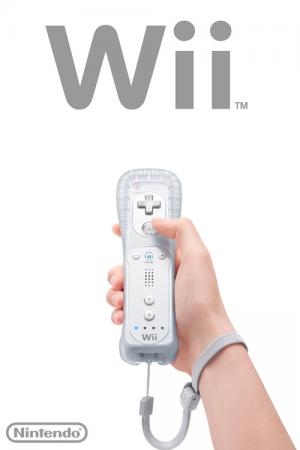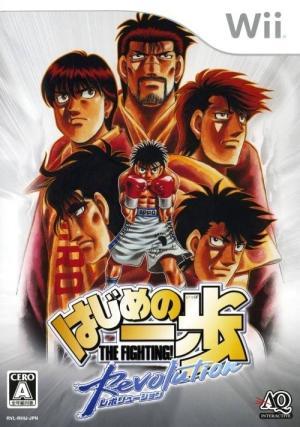
Nintendo Wii
Nintendo Wii Specifications
| Manufacturer: | Foxconn |
| Developer: | Nintendo |
| CPU: | IBM PowerPC Broadway @ 729 MHz |
| Memory: | 24 MB 1T-SRAM @ 324 MHz (2.7 GB/s) + 64 MB GDDR3 SDRAM |
| Graphics: | ATI Hollywood GPU @ 243 MHz |
| Sound: | Stereo – Dolby Pro Logic II-capable |
| Medium: | Disc |
| Display: | 480p (PAL/NTSC), 480i (PAL/NTSC) or 576i (PAL/SECAM), standard 4:3 and 16:9 anamorphic widescreen |
| Controllers: | 4 |
The Wii is a home video game console released by Nintendo on November 19, 2006. As a seventh-generation console, the Wii primarily competes with Microsoft's Xbox 360 and Sony's PlayStation 3. Nintendo states that its console targets a broader demographic than that of the two others. As of November 2011, the Wii leads the generation over the PlayStation 3 and Xbox 360 in worldwide sales, and in December 2009 broke the record for best-selling console in a single month in the United States.
A distinguishing feature of the console is its wireless controller, the Wii Remote, which can be used as a handheld pointing device and detects movement in three dimensions. Another distinctive feature of the console is WiiConnect24, which enables it to receive messages and updates over the Internet while in standby mode.
The Wii is Nintendo's fifth home console and the direct successor of the Nintendo GameCube, being fully backwardly compatible with all GameCube games and most accessories.
In developing the Wii, Nintendo president Satoru Iwata directed the company to avoid competing with Microsoft and Sony on computational graphics and power and instead to target a broader demographic of players through novel gameplay. Game designers Shigeru Miyamoto and Genyo Takeda led the console's development under the codename Revolution. The primary controller for the Wii is the Wii Remote, a wireless controller with both motion sensing and traditional controls which can be used as a pointing device towards the television screen or for gesture recognition. The Wii was Nintendo's first home console to directly support Internet connectivity, supporting both online games and for digital distribution of games and media applications through the Wii Shop Channel. The Wii also supports wireless connectivity with the Nintendo DS handheld console for selected games. Initial Wii models included full backward compatibility support for GameCube games and most accessories. Later in its lifecycle, two lower-cost Wii models were produced: a revised model with the same design as the original Wii but removed the GameCube compatibility features and the Wii Mini, a compact, budget redesign of the Wii which further removed features including online connectivity and SD card storage.
Because of Nintendo's reduced focus on computational power, the Wii and its games were less expensive to produce than its competitors. The Wii was extremely popular at launch, causing the system to be in short supply in some markets. A bundled game, Wii Sports, was considered the killer app for the console; other flagship games included entries in the Super Mario, Legend of Zelda, Pokémon, and Metroid series. Within a year of launch, the Wii became the best-selling seventh-generation console, and by 2013, had surpassed over 100 million units sold. Total lifetime sales of the Wii had reached over 101 million units, making it Nintendo's best-selling home console until it was surpassed by the Nintendo Switch in 2021. As of 2022, the Wii is the fifth-best-selling home console of all time.
The Wii repositioned Nintendo as a key player in the video game console marketplace. The introduction of motion-controlled games via the Wii Remote led both Microsoft and Sony to develop their own competing products—the Kinect and PlayStation Move, respectively. Nintendo found that, while the Wii had broadened the demographics that they wanted, the core gamer audience had shunned the Wii. The Wii's successor, the Wii U, sought to recapture the core gamer market with additional features atop the Wii. The Wii U was released in 2012, and Nintendo continued to sell both units through the following year. The Wii was formally discontinued in October 2013, though Nintendo continued to produce and market the Wii Mini through 2017, and offered a subset of the Wii's online services through 2019.
Latest on Nintendo Wii
![Deer Drive [2x Gun Collector Edition]](https://m1.videogamemeta.com/deer-drive-2x-gun-collector-edition-nintendo-wii-fct.jpg)
Deer Drive [2x Gun Collector Edition]
Bring all the ammo you can get your hands on, because open season just arrived - big time! Deer Drive is an arcade-style 3D deer hunting game - take a...
![Deer Drive [Collector Edition]](https://m1.videogamemeta.com/deer-drive-collector-edition-nintendo-wii-fct.jpg)
Deer Drive [Collector Edition]
Bring all the ammo you can get your hands on, because open season just arrived - big time! Deer Drive is an arcade-style 3D deer hunting game - take a...
![Crash Car Racer [Wheel Bundle]](https://m1.videogamemeta.com/crash-car-racer-wheel-bundle-nintendo-wii-fct.jpg)
Crash Car Racer [Wheel Bundle]
Smash the competition to bits! Welcome to the game that rewards you for crashing! It's a race to the finish as you collide with other vehicles, smash...
![Dino Strike [Gun Bundle]](https://m1.videogamemeta.com/dino-strike-gun-bundle-nintendo-wii-fct.jpg)
Dino Strike [Gun Bundle]
Bundled with a gun peripheral, players blast through jungles filled with prehistoric beasts looking to put them on the endangered species list. Choose...

Aladin Magic Racer
Have you ever dreamed of flying a magic carpet through wild race tracks in the midst of scenery inspired by the most beautiful places in the universe?...
![Cocoto Surprise [Fishing Rod Bundle]](https://m1.videogamemeta.com/cocoto-surprise-fishing-rod-bundle-nintendo-wii-fct.jpg)
Cocoto Surprise [Fishing Rod Bundle]
With a unique fishing rod accessory, developed especially for Wii, players fish for presents hidden throughout the four worlds in the series. Each uni...

Hajime no Ippo Revolution
Victorious Boxers: Revolution is a challenging, intense boxing title for the Wii. The first dedicated boxing title for the Wii, this game makes full u...

Des Chiffres & des Lettres - Le Jeu Officiel
Mettez votre cerveau à l'épreuve ! Faites chauffer vos méninges, en solo, en famille ou entre amis ! Que vous soyez débutant ou expert, Des Chiffr...

Off Road
Off Road (released in North America as Ford Racing Off Road) is a 2008 racing video game developed by Razorworks and published by Xplosiv. It is the s...
![Wild Adventures: Hunting & Fishing [Rifle & Fishing Rod Bundle]](https://m1.videogamemeta.com/wild-adventures-hunting-fishing-rifle-fishing-rod-bundle-nintendo-wii-fct.jpg)
Wild Adventures: Hunting & Fishing [Rifle & Fishing Rod Bundle]
EXTREME FISHING • Up to 4 players simultaneously. • Compatible Wii Fishing Rod. • More than 50 species to be fished in 3 different modes. • Game...